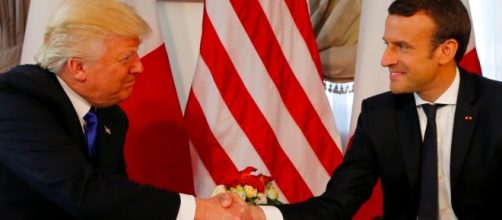President Donald J. trump will soon arrive in Paris to celebrate Bastille Day on the invitation of French President Emmanuel Macron. The invitation has raised eyebrows across the international community, especially after the exceptionally long handshake the two men exchanged during their first meeting. However, as the presidents oversee a military parade on the Champs-Elysee and dine in the Eiffel Tower, it might be discovered that they have more in common than was initially thought.
France Rises to Prominence
Traditionally, France has played a less out-sized role in global politics than its counterparts, Germany and the United Kingdom.
It now finds itself in the limelight at Germany prepares for a critical election in the fall, and as the UK Parliament undergoes the harrowing Brexit process. Both Angela Merkel, Germany’s chancellor and Theresa May, her British counterpart, have taken tougher stances toward the new U.S. administration. After a G7 meeting earlier this year, Merkel remarked on how Europe now stood alone in international politics. Trump also recently delayed a trip to the United Kingdom until 2018 after May came under fire from her constituents for initially extending the invitation.
Macron is stepping in to fill this void. After a frosty beginning to the relationship, Macron and Trump were photographed smiling and shaking hands at the G20 summit in Hamburg, Germany.
Like Trump, Macron radically altered the calculus of politics in his own country. After beginning the campaign with no formal political party backing him, or any experience in elected office, Macron was able to sweep to victory, trouncing all of his more established opponents. Like Trump, Macron wants “drain the swamp”, or at least do the French equivalent, by clearing out “la ancien regime”. In a speech at the Palace of Versailles in early July, Macron announced his plans to reduce the seats in France's parliament by at least a third, echoing Trump’s campaign promises to thin out the Washington bureaucracy.
Macron the Pragmatist
While they share similar opinions on revolutionizing the political establishment, Trump and Macron differ sharply on what to do once the revolution has been realized.
Trump audibly supported Marine Le Pen (Macron's fiercest opponent) and her Eurosceptic, anti-immigration policies, while Macron is a self-proclaimed Europhile. Macron, it seems, is willing to work around these issues. He is putting differences between the two countries aside in order to focus on their shared history and, possibly, shared future. America is important to France, regardless of who is in the White House, and Macron seems eager to capitalize on that.
Macron himself has a history of making pragmatic decisions for his own self-advancement: from his early beginnings as an apprentice under celebrated philosopher and political commentator Paul Ricoeur to serving as economy minister under the former Socialist President Francois Hollande.
It seems that Macron is not one to shy away from an opportunity, and Trump is definitely no exception.
This Bastille Day, the French will celebrate the success of revolutions past, and prepare to watch as Macron and Trump orchestrate revolutions of their own.


